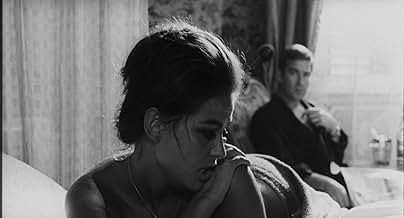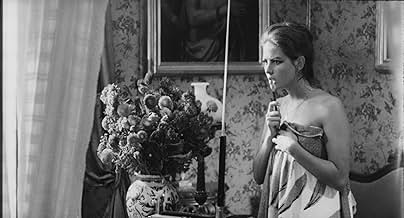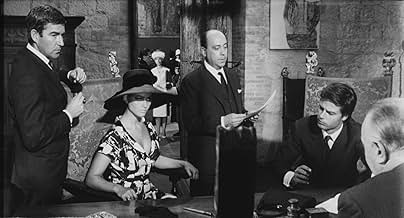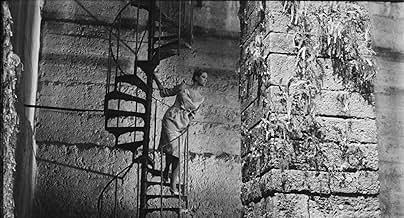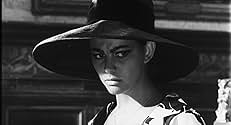Agrega una trama en tu idiomaSandra returns to her childhood village to take care of family business, but her childhood memories and secrets soon overcome her.Sandra returns to her childhood village to take care of family business, but her childhood memories and secrets soon overcome her.Sandra returns to her childhood village to take care of family business, but her childhood memories and secrets soon overcome her.
- Dirección
- Guionistas
- Elenco
- Premios
- 3 premios ganados y 2 nominaciones en total
- Party Guest
- (sin créditos)
- Party Guest
- (sin créditos)
Opiniones destacadas
Luchino Visconti's Sandra (1965), is a puzzling but splendorous visual treat that depicts incest, homo-eroticism, madness and collaboration with the Nazis. Its fairly slow pacing and reluctance to make obvious useful information will challenge those who spend hours a day gazing down at their QWERTY devices. However, "Sandra" is very rich and satisfying; it is flawlessly served up by the great Visconti. (I like it more than "The Leopard.")
A modernized retelling of the Greek myth Electra, an attractive, upper-class, socialite couple (Claudia Cardinale in the eponymous role, Michael Craig as her husband Andrew) return to the mansion of Sandra's youth (which she was forced to flee), to attend a small ceremony honoring her father, who was murdered by the Nazis at a concentration camp. When she is reunited with her unstable brother, Gianni (Jean Sorel), the physical connection between them is made very obvious. Their closer-than-normal relationship is never a secret to the audience, but revealing it is a big concern to Andrew and other observers, such as Sandra's barrister stepfather Gilardini (Renzo Ricci). The perpetually nervous Gilardini and Sandra's clinically insane mother (Marie Bell) may also have collaborated with the Nazis by betraying Sandra's father, creating an unusual conflict of pairs.
Shot in high-contrast Black and White, Visconti's skill at shooting his photogenic cast in tight quarters is evident. Because the English translation of the film is somewhat talky, it helps to develop the skill of quickly reading the subtitles in order to enjoy Visconti's work. It is amazing how precise and detailed the imagery is. The scenes between the anguished brother and steely sister are frequently filled with erotic tension. Visconti's trademark homo-eroticism is also present, but to a smaller degree.
One of the more interesting characters is Sandra's "first love" who is now a physician. He seems to personify not just a mixture of Sandra's husband and her brother, but also the Nazi collaborator Gilardini. At least, that's my interpretation of the final image.
Visconti's depiction of a decaying aristocratic family has great depth, and fans of the great director will not be disappointed with it.
Incest is a leading theme in Sandra; we are given clues about it throughout the film, but not a definite proof. The affair of the siblings remains in the shadows and there's something odd in the relationships between the children and the parents. Visconti first approaches this controversial theme calmly, showing it as a small thing - we are not told much about it. But then he increases it to enormous dimensions.
Luchino Visconti sets this story to a dying city around a aristocratic class that is dying out. Great tragedies, misfortunes and decay lead this class to extinction. Already in Senso Visconti achieved an aesthetic revolution, but he continues this in Sandra with a political and ethic revolution. Sandra is not the easiest film by Visconti and many people in the theater seemed to neglect it. In the beginning I found it a little unreachable and absurd but it grew up to be a beautiful allegorical description of the decay of an aristocratic family.
¿Sabías que…?
- TriviaOne of the first films in which Claudia Cardinale, who was born in Tunisia and whose first language was French, dubbed herself in Italian.
- Citas
Gianni Wald-Luzzati: Why can't you be honest for once? Did God tell you to become a nun? Did he tell you to get married and that would satisfy you? Did he tell you that nun's are sick with desire and frustration? That they're willing to mortify their flesh? Now, why must you torment yourself? Why should you fill so full of guilt? So wretched and alone?
- ConexionesFeatured in Visconti (1967)
- Bandas sonorasPrelude, chorale and fugue
Written by César Franck
Selecciones populares
- How long is Sandra?Con tecnología de Alexa
Detalles
- Fecha de lanzamiento
- Países de origen
- Sitio oficial
- Idiomas
- También se conoce como
- Sandra
- Locaciones de filmación
- Geneva, Canton de Genève, Suiza(opening sequence: party at Sandra and Andrew's apartment)
- Productoras
- Ver más créditos de la compañía en IMDbPro
Taquilla
- Total a nivel mundial
- USD 927
- Tiempo de ejecución1 hora 45 minutos
- Color
- Mezcla de sonido
- Relación de aspecto
- 1.66 : 1
Contribuir a esta página


